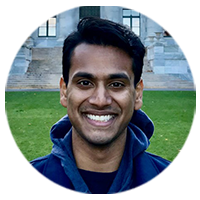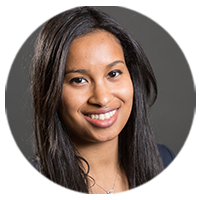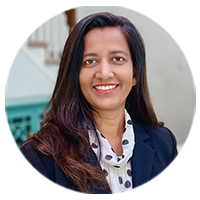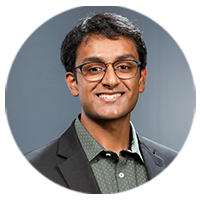Meet Daniel, Yazmin, Divya, and Aravind: our latest cohort of Founders Fellows who recently began the immersive 12-month program for researchers with STEM degrees hoping to transition their discoveries into marketplace. Find out what they’re working on, what drives them to make a difference, and the support they are looking for in our fellowship.

Daniel Baker
Working to unite the fields of cell therapy and longevity to generate translational cellular products to ameliorate aging and its associated pathologies.
What interested you in the Founders Fellowship and what are you hoping to get out of it?
Getting therapies to patients is my motivating reason to be in science. I’ve seen how crucial it is to partner beyond academic medicine to get discoveries into the clinic. Starting a company from academia can feel daunting, but the Founders Fellowship afforded me the opportunity to gain first-hand knowledge and formalize a path to translate our discoveries to help patients.
Describe the issue/challenge you are hoping to solve.
Aging is the single greatest risk factor for every major chronic disease. Only in recent years have we uncovered that it is possible to modulate the rate of aging and thus improve health holistically. My work focuses on uniting the fields of cellular therapy and longevity to improve health.
Why did you decide to become an entrepreneur?
It became clear that the best way to ensure discoveries were making it to the clinic, was to play a role in taking them there. I’ve seen how critical this was as CAR T therapy was used in cancer and I hope to play a similar role as cell therapies move to aging. I also find that the process of distilling scientific discoveries into everyday language helps ensure our science stays centered on helping patients.
What is it about Philly that makes it an ideal location to help you get your startup off the ground?
Philly has a wonderful ecosystem, especially when it comes to cell therapy. The pioneering trials for CAR T therapy were done here and over the last decade it has become one of the preeminent cities for cell therapy. Additionally, to the scientific expertise, there is a ton of support for founders making this an ideal setting for this startup.

Yazmin Feliz
Developing low-cost ultrasound prototypes.
What interested you in the Founders Fellowship and what are you hoping to get out of it?
I was in search of a support system and the resources offered by the Founders Fellowship are fantastic! Starting a company can be a lonely road with many challenges and I’m looking forward to engaging with our team of industry experts and investors. Additionally, I’m excited to leverage collaborative experiences with the nearby universities such as UPenn and Temple and connect with their talent in the medical space as I build my venture in the Femtech area.
Describe the issue/challenge you are hoping to solve.
The in-vitro fertilization space has not changed at all since its inception in the 1990s. To make the IVF process easier and more accessible to the general population, ultrasound monitoring, which would routinely occur during office visits, can be offered at-home and be self-guided. Our AI-paired solution is a lightweight portable diagnostic ultrasound that integrates into IVF process to reduce not only time spent going to office visits but also costs associated with ultrasound scans and image interpretation, reducing the burden on both patients and medical staff.
Why did you decide to become an entrepreneur?
While pursuing undergraduate studies, I found my passion in research during Freshman year when I joined a professor’s lab at RPI creating nano-coated bacteria-repellent coatings for food processing machinery. I was excited to apply my skills in science while tackling real-world problems, and more importantly- see that I could make a difference! That first experience in the lab for me yielded a publication, a prize at a research symposium, plus an internship in supply chain and business operations. Through those opportunities I became interested in helping research become translational, and understanding how the innovations we worked on in the lab could one day be deployed and commercialized. From that point on, I started evaluating each project for its business potential and merging my scientific background with business experience from industry.
I want to dedicate this startup to my dad whom I lost to COVID and cardiac arrest a few years ago. He is my biggest inspiration to form this startup and ensure I save cardiac patients’ lives through him.
What kickstarted your interest in the life sciences?
When making the important decision of selecting a PhD thesis topic, and what I would spend the next 5 years investigating (no pressure), I wanted to support lifesaving technology and solve an essential global problem. During my time at Johnson & Johnson, I became much more focused on maternal and neonatal health. I was surprised to hear that according to the World Health Organization, over 60 percent of the world's population does not have access to medical imaging. Ultrasound is so intrinsic to supporting basic decision making in healthcare and is routinely used in pregnancy monitoring to plan for life-saving intervention such as cesarean sections. It is a modality we use so often in the United States, that it is easy to take it for granted. Due to barriers in cost, technical complexity, and limited access to medical facilities, approximately 836 women die every day from pregnancy related complications, most occurring in resource-constrained settings where medical imaging is scarce. While seeing the scope and complexity of this problem, I decided to tackle this challenge in healthcare and assembled a team of scientists, engineers, and physicians to develop, test, and pilot low-cost ultrasound prototypes with the aim of addressing this disparity.
What is it about Philly that makes it an ideal location to help you get your startup off the ground?
I was born in Philadelphia, right here at Temple University Hospital and moved to Bronx, NY, at a young age. I’m happy to be back in the area and part of the budding ecosystem of science and technology that is helping drive innovation into Philadelphia through a growing ecosystem of entrepreneurs.

Divya Gowdar, Founder of NubGenix
A quality and regulatory consulting firm who provides services related to design and implementation of Quality Management System (QMS), establishing regulatory, quality and compliance strategies for product launch and streamlining workflows such as Audit and Inspection Management, Post Market Surveillance, and much more.
What interested you in the Founders Fellowship and what are you hoping to get out of it?
The fact that there is ongoing support for the next 12 months to build your startup attracted me to this program without much financial obligation from me. I am really hoping to get support to form the legal entity, team structure, prototyping, fund raising and commercialization process.
Describe the issue/challenge you are hoping to solve.
We are trying to develop an AI and cloud-based software with automated proprietary algorithm, which measures and analyzes ECG data capable of detecting Atrial Fibrillation (AFib) and other cardiac arrhythmias with high accuracy. The device provides a remote monitoring method to assess atrial fibrillation patients and ability for healthcare providers to prescribe corresponding (AFib) therapies and treatments if and when needed.
There are currently other devices and competitors that offer similar technologies and diagnosis, however we are trying to understand the differentiators such as can the device and diagnosis be improved in variety of ways including accuracy and if it can be applied for pediatric patients.
Why did you decide to become an entrepreneur?
I want to dedicate this startup to my dad whom I lost to COVID and cardiac arrest a few years ago. He is my biggest inspiration to form this startup and ensure I save cardiac patients’ lives through him. I also like the flexibility and independence it offers being an entrepreneur.
What kickstarted your interest in the life sciences?
Just the idea that life science provides an opportunity to improve the quality of life of patients and happiness it provides to lead a pain free life motivates me every day to be in this industry.
What is it about Philly that makes it an ideal location to help you get your startup off the ground?
Philly is my home with my kids and husband. Philly is also a great hub for life science industries and provides great startup support from ground up to commercializing your startup. All these reasons convince me to be in Philly!

Aravind Krishnan, Founder of ToxiSense
A biotech venture developing more sustainable and cost-effective bacterial endotoxin assays by engineering a plant biosensor system
What interested you in the Founders Fellowship and what are you hoping to get out of it?
As someone who is new to the startup space and is building a life sciences startup, the Founders Fellowship seemed like the perfect opportunity to learn how to translate my product from the lab to the real-world. Considering myself as a scientist at heart, I don't have as much expertise on the business development side, and I knew that understanding this aspect would be crucial to effectively translating my product from the bench to the real-world. Through the Founders Fellowship, I hope to delve deep into these principles behind building an effective life sciences startup, including both high-level concepts like translational strategy, but also the low-level considerations, such as insurance and tax, that often go unnoticed yet are crucial to building an effective business in any industry. I'm also looking forward to working closely with my peers in the Founders Fellowship and learning from each other’s backgrounds and experiences as we go through the program.
In a few sentences describe the issue/challenge you are hoping to solve.
All medicines and medical devices that contact our bloodstream are required by the FDA and other regulatory bodies worldwide to be tested for endotoxins, the sickness-causing molecule from many species of pathogenic bacteria. Currently, testing for these endotoxins is done using a substance called Limulus amoebocyte lysate, or LAL. LAL is made from a protein in the blood of horseshoe crabs, which have evolved over millions of years to have their blood coagulate, or solidify, in response to these bacterial toxins. While the pharmaceutical industry has been using this method for about four decades, the test has two major problems: it is unsustainable and extremely expensive. Harvesting these horseshoe crabs has been found by ecologists to decimate coastal ecosystems, including the nearby Atlantic coast, since horseshoe crabs form the center of the food web. Additionally, just one gallon of horseshoe crab blood costs $60,000, making the 100 million tests conducted every year extremely expensive, which contributes to the high cost of medical products we face today. With my startup, ToxiSense, I am developing a genetically engineered plant-based solution. Our engineered plants luminesce, or glow, at different levels of brightness, based on the concentration of bacterial endotoxin in a sample applied to it. The test is not only much more sustainable and just 5% of the cost, but promising initial results point to improved performance as well. With septic shock caused by endotoxins being the leading cause of death in hospitals worldwide and endotoxin testing being crucial to ensure patient safety, we hope to make endotoxin testing easier and more accessible while also preserving our crucial ecosystems worldwide.
Why did you decide to become an entrepreneur?
My journey into entrepreneurship initially started with the science behind ToxiSense. The ToxiSense story goes back about six years, when at the end of 8th grade, I took a trip to the nearby Jersey Shore. It was there that I first learned from local ecologists about the devastation being caused to the vital horseshoe crab population because of being overharvested for their blood. Curious as to why such an advanced and forward-looking industry like pharmaceuticals and biotechnology was still using a seemingly primitive and flaw-ridden solution, I took the time that summer to extensively research the problem and understand if there was a better solution out there. Upon learning this was the standard used worldwide, and eager to try making a small change to help my local ecosystem, I somewhat naively set out to develop a better solution, now as a newly entered high schooler. Part of my research was to understand if any other organisms displayed a similar immune response to these bacterial endotoxins. One of the ones I found was Arabidopsis thaliana, a small weed-like plant that is widely used in plant biology research and is in the same family as familiar plants like cauliflower and cabbage. I hypothesized that I could develop a system that somehow provided an easily visualizable signal of these plants' endotoxin immune response as a more sustainable test kit. After pitching my idea to hundreds of labs at nearby universities, one ultimately graciously took me in, and I was given the opportunity to develop this project there, having a basic working prototype by the end of high school. The science behind it was fascinating, and I thought my journey working on this problem ended there. However, after coming to Penn as a first year in the fall of 2021, I discussed this idea with some of my professors, who encouraged me of its real-world potential and to develop it into a market-ready product. Initially skeptical, I took their advice and embarked on the development of the business side behind ToxiSense, which I've continued until now. Along the way, I've loved the opportunity to connect my interests in science and the fundamental mission behind ToxiSense with new skills in business development, from go-to-market strategy to regulatory approval plan, that will allow ToxiSense to move out of the laboratory and into the real-world, to provide better hundreds of millions of better bacterial endotoxin tests worldwide, while hopefully helping to preserve our ecosystems meanwhile. The journey so far has been exhilarating, and I look forward to the next steps I will take through the Founders Fellowship.
My journey into entrepreneurship initially started with the science behind ToxiSense. The ToxiSense story goes back about six years, when at the end of 8th grade, I took a trip to the nearby Jersey Shore. It was there that I first learned from local ecologists about the devastation being caused to the vital horseshoe crab population because of being overharvested for their blood.
What kickstarted your interest in the life sciences?
My interest in the life sciences most significantly started when I started working on the science behind ToxiSense. I had generally been fascinated by biology, and especially the idea of genetically engineering organisms to modify their function and serve new purposes, but I found my true love for the science when working to engineer this plant-based alternative to the current endotoxin test. I would spend countless hours in the lab, experimenting through the scientific method, developing hypotheses, conducting experiments to obtain data and validate them, and then develop new questions based on the data. This process of iterative development was especially exciting because I was getting to actually put my knowledge of these fields into action, working to develop a solution that could potentially have a significant impact. I also loved combining numerous fields, including cell biology, immunology, microbiology, biochemistry, and mathematics, to be able to engineer this solution. Life sciences is also a field in which there is an incredible amount of collaboration, which I've loved getting to be a part of. From my mentors back in high school to the scientific collaborators I continue to work with today, there is something to learn from everyone I work with, and I've enjoyed the process of pondering over a problem, exchanging ideas, and synthesizing knowledge to develop a solution. Overall, I'm incredibly thankful for having this opportunity so early on to be able to work to help advance the field by at least a small extent and use my interests to start generating a real-world impact.
What is it about Philly that makes it an ideal location to help you get your startup off the ground?
Philadelphia is growing incredibly fast as perhaps one of the nation's capitals of life sciences innovation. Thanks to exciting developments made both at academic centers like Penn, as well as private biotech companies in the area, many of which are spinouts from these academic labs, some of life sciences' most groundbreaking innovations have been emerging out of Philly in recent years. From engineered immunotherapies for cancers and now other diseases, to gene therapies for seemingly intractable diseases, to even mRNA-based therapeutics that formed the basis of billions of vaccines that mitigated the COVID-19 pandemic, Philadelphia has been making incredible contributions to the field. Building ToxiSense in this environment is ideal because there is so much, I can learn from the scientists and life sciences entrepreneurs in the area who have made these innovations possible. The life sciences community in Philadelphia is also very collaborative, and people are not only willing but eager to help each other out on their respective research projects and combine backgrounds to create cross-disciplinary teams that can better tackle some of the most pressing challenges in healthcare. I see a bright future for Philadelphia as the nation's capital for innovation and advancement in healthcare and the life sciences, and I'm excited to be able to develop ToxiSense in this exciting environment.
The Founders Fellowship is generously supported by CIC Labs + Innovation Campus in Philadelphia.



